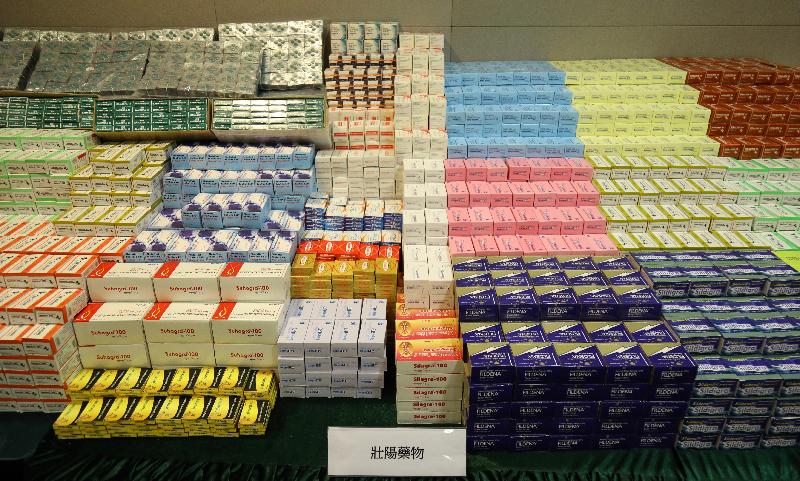​Hong Kong Customs seized a total of about 1.6 million tablets of suspected controlled medicines with an estimated market value of about $55 million, among which over 70 per cent were controlled virility products, at Hong Kong International Airport (HKIA), in Hung Hom and in Sheung Wan from September 28 to October 5.
Through risk assessment, Customs officers on September 28 selected and inspected a batch of outbound air parcels destined for Spain from Hong Kong at HKIA. About 40 000 tablets of suspected controlled medicines were found inside the parcels.
After investigation, Customs officers on September 30 arrested a 39-year-old woman suspected to be in connection with the case at the post office in Hung Hom and seized about 60 000 tablets of suspected controlled medicines in the outbound air parcels mailed by her. The officers raided an industrial unit in Hung Hom on the same day. About 1.31 million tablets of suspected controlled medicines were found in the unit and a 41-year-old woman suspected to be connected to the case was arrested.
Upon follow-up investigation, Customs officers further seized about 190 000 tablets of suspected controlled medicines at HKIA and a logistics centre in Sheung Wan from October 2 to 5. A 34-year-old man and a 27-year-old woman suspected to be connected to the case were arrested in Tsing Yi and North Point on October 5 and 6 respectively.
Later, Customs officers conducted a financial investigation into the above-mentioned case. It has been initially revealed that the arrested persons were suspected to have laundered the crime proceeds through fund transfers via bank accounts and money service operators to conceal suspected crime proceeds from overseas areas.
After investigation, Customs officers on October 22 arrested a 41-year-old man suspected to be in connection with money laundering in Tseung Kwan O.
Investigation is ongoing. Customs will carry out in-depth investigation in the aspects of dealing with crime proceeds and money laundering. All of the arrested persons have been released on bail pending further investigation and the likelihood of further arrests is not ruled out.
Customs believes that the operation has smashed a syndicate that was attempting to illegally export controlled medicines, which also involved money laundering of about $20 million in crime proceeds. The department will continue to maintain stringent law enforcement and close contact with relevant government departments and the logistics industry to combat illegal export of controlled medicines.
Under the Import and Export Ordinance, any person who exports pharmaceutical products and medicines without a valid export licence commits an offence. The maximum penalty upon conviction is a fine of $500,000 and imprisonment for two years.
Under the Pharmacy and Poisons Ordinance, any person who possesses any poison included in Part 1 of the Poisons List other than in accordance with provisions commits an offence. The maximum penalty upon conviction is a fine of $100,000 and imprisonment for two years.
Under the Organized and Serious Crimes Ordinance, a person commits an offence if he or she deals with any property knowing or having reasonable grounds to believe that such property in whole or in part directly or indirectly represents any person's proceeds of an indictable offence. The maximum penalty upon conviction is a fine of $5 million and imprisonment for 14 years while the crime proceeds are also subject to confiscation.
Members of the public may report any suspected violation of the above-mentioned ordinances to Customs' 24-hour hotline 2545 6182 or its dedicated crime-reporting email account (crimereport@customs.gov.hk).
Follow this news feed: East Asia









